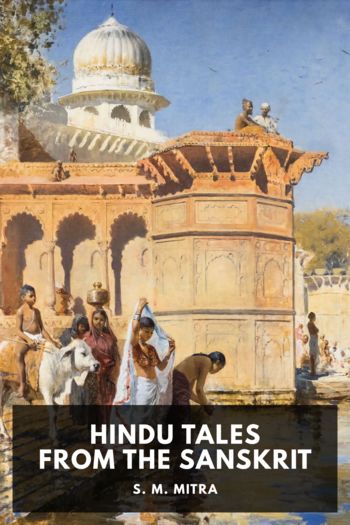Hindu Tales from the Sanskrit by S. M. Mitra (latest ebook reader TXT) 📕

Description
In Hindu Tales from the Sanskrit S. M. Mitra has collected and transcribed in English various fables and short stories from across the Sanskrit tradition. The stories’ characters range from kings to mice and they find themselves in all manner of situations, from the mundane to the magical. Regardless of the setting, there is a common thread of moral choices, whether personal or for family and friends, that runs through the collection.
Siddha Mohana Mitra was an Indian author and political commentator, who was most famous at the time for his numerous books and articles for the British market on the colonial rule of India. This collection, edited by the author and translator Nancy Bell, was published in 1919, and was designed to be both appealing as a set of fairy tales and useful as a teaching tool for children’s moral perception of the world.
Read free book «Hindu Tales from the Sanskrit by S. M. Mitra (latest ebook reader TXT) 📕» - read online or download for free at americanlibrarybooks.com
- Author: S. M. Mitra
Read book online «Hindu Tales from the Sanskrit by S. M. Mitra (latest ebook reader TXT) 📕». Author - S. M. Mitra
The city which occupied the site of present Patna was known as Patali-Putra in the time of Alexander the Great. ↩
There are seventy-two versions of this tale in vogue amongst the high castes of India; the one here given is taken from Raj-Yoga, the highest form of Hindu ascetic philosophy. ↩
ColophonHindu Tales from the Sanskrit
was published in 1919 by
S. M. Mitra.
Google
sponsored the production of this ebook for
Standard Ebooks.
It was produced by
Robin Whittleton,
and is based on a transcription produced in 2004 by
The Online Distributed Proofreading Team
for
Project Gutenberg
and on digital scans available at the
Internet Archive.
The cover page is adapted from
Along the Ghats,
a painting completed in 1883 by
Edwin Lord Weeks.
The cover and title pages feature the
League Spartan and Sorts Mill Goudy
typefaces created in 2014 and 2009 by
The League of Moveable Type.
The first edition of this ebook was released on
March 18, 2021, 8:04 p.m.
You can check for updates to this ebook, view its revision history, or download it for different ereading systems at
standardebooks.org/ebooks/s-m-mitra/hindu-tales-from-the-sanskrit.
The volunteer-driven Standard Ebooks project relies on readers like you to submit typos, corrections, and other improvements. Anyone can contribute at standardebooks.org.
UncopyrightMay you do good and not evil.
May you find forgiveness for yourself and forgive others.
May you share freely, never taking more than you give.
Copyright pages exist to tell you can’t do something. Unlike them, this Uncopyright page exists to tell you, among other things, that the writing and artwork in this ebook are believed to be in the U.S. public domain. The U.S. public domain represents our collective cultural heritage, and items in it are free for anyone in the U.S. to do almost anything at all with, without having to get permission. Public domain items are free of copyright restrictions.
Copyright laws are different around the world. If you’re not located in the U.S., check with your local laws before using this ebook.
Non-authorship activities performed on public domain items—so-called “sweat of the brow” work—don’t create a new copyright. That means nobody can claim a new copyright on a public domain item for, among other things, work like digitization, markup, or typography. Regardless, to dispel any possible doubt on the copyright status of this ebook, Standard Ebooks L3C, its contributors, and the contributors to this ebook release this ebook under the terms in the CC0 1.0 Universal Public Domain Dedication, thus dedicating to the worldwide public domain all of the work they’ve done on this ebook, including but not limited to metadata, the titlepage, imprint, colophon, this Uncopyright, and any changes or enhancements to, or markup on, the original text and artwork. This dedication doesn’t change the copyright status of the underlying works, which, though believed to already be in the U.S. public domain, may not yet be in the public domain of other countries. We make this dedication in the interest of enriching our global cultural heritage, to promote free and libre culture around the world, and to give back to the unrestricted culture that has given all of us so much.





Comments (0)